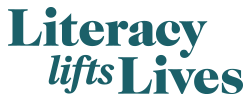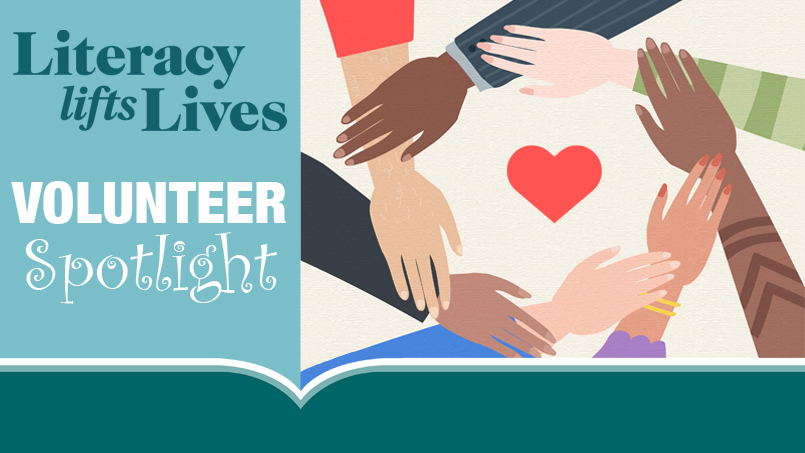Volunteer Spotlight: Catherine Coundjeris, “Reflections: Voices of English Learners” Editor and Muse
Catherine Coundjeris’ love of words and writing has been a constant in her life, from her days teaching college students the art of writing to her decision to share her passion for literacy with students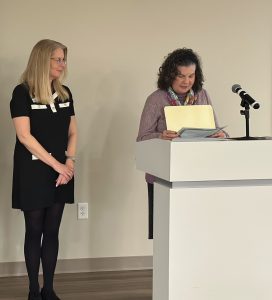 needing help learning the basics. “After moving to Frederick, I sought out the Literacy Council Of Frederick County in 2011,” she says. “I had started out thinking I would work as a tutor with Basic students (English speakers).” A few years later, she helped another tutor in a class for ESL (English as a Second Language) students and found herself really enjoying facilitating the new student-led conversation class.
needing help learning the basics. “After moving to Frederick, I sought out the Literacy Council Of Frederick County in 2011,” she says. “I had started out thinking I would work as a tutor with Basic students (English speakers).” A few years later, she helped another tutor in a class for ESL (English as a Second Language) students and found herself really enjoying facilitating the new student-led conversation class.
 Catherine discovered that some of the students in her conversation class had degrees from their native countries and hoped to continue pursuing their professional interests in the U.S. To accomplish that, she realized they would have to be able to write proficiently in English. “At the time, the Literacy Council wasn’t offering any writing classes, so I was able to start two [of them]” in 2014, with the support of Laurie Fisher, the council’s Executive Director.
Catherine discovered that some of the students in her conversation class had degrees from their native countries and hoped to continue pursuing their professional interests in the U.S. To accomplish that, she realized they would have to be able to write proficiently in English. “At the time, the Literacy Council wasn’t offering any writing classes, so I was able to start two [of them]” in 2014, with the support of Laurie Fisher, the council’s Executive Director.
“I was touched by many of their stories as well as amazed at what they could achieve writing in a language other than their own.” Memoirs were the dominant theme, but they also contributed pieces about history, their everyday lives, and even their hopes for the future. She felt that the work should be showcased in some way, to let others know what these students could do. She wanted them to have a place where they could lend their voices and be heard, too. It would be a way of documenting their hard work and their progress. “I also felt that it would be edifying for other people to be able to read these wonderful stories.”
Catherine believed that, beyond the Literacy Council’s students, tutors, and staff, “Reflections would have an impact on people who are supporting the council and give them some insight into what we do here.”
As the idea of a literary magazine began to take hold, Catherine says “I spoke to another tutor, Julie Heifetz, author of ‘As Far As The I Can See’ among other works, and she was immediately on board. First, we thought [the publication] could have stories [written by] tutors and students. But we decided to limit it to students,” thus ensuring enough space for their work. “Julie also had a graphic designer friend, Betsy Maymon, who said she would volunteer to be the publication’s graphic designer.”
The idea attracted a very receptive audience at the Literacy Council. “I told Laurie about it, she liked it right away, as did [the Board of Directors]. I think the board paid for the first one,” Catherine recalls. By the second issue, the council had acquired sponsors to help support the magazine’s production. Although Reflections: Voices of English Learners is available digitally, a small number of issues are printed each year.
When Catherine told the writing class about the new magazine, they were very enthusiastic. She believed that having their stories published would give students more confidence and the incentive to continue learning the English language. 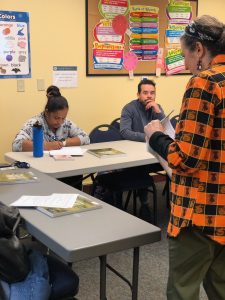
The pieces for the first issue started coming together. Julie Heifetz came up with the title, “Reflections.” Laurie suggested that they bring it to the students and see what title they would pick. “They liked Reflections, but added ‘Voices of English Learners’,” Catherine says.
All adult learners at the Literacy Council are welcome to submit a story for Reflections: Voices of English Learners, and Catherine tries to use every piece she gets. From the beginning, Catherine says, “there have been stories about life-changing events, from fleeing war-torn countries like Syria, Ukraine, and Haiti, to the new lives they have found in the U.S.—and how they are navigating them in their new communities. You won’t find [stories like this] in the usual news reports.” Along with stories that tell of tragedies, many others are filled with joy and excitement about making a new life. There are stories about pets, wonderful traditions, holidays, food, friends, and loved ones close by or far away. One story in the upcoming issue, “Picking Figs,” is an evocative memory of life in Syria before war began to take its toll. There are also flights of fancy, contemplations about the human condition, wild imaginative rides, poetry, and more. She says the publication may not always be easy to read, but its stories are important in what they reveal about people many of us know little about.
“It’s real education working with these students,” Catherine says. “They teach me so much. In the last issue, the story “My Two Lovely Girls” describes how a mother gained English skills and watched her children grow at the same time. And as they took to language, they taught her. It’s a lovely story about how a mother learns from her children.”
Editing the students’ copy is not always easy, as the English fluency varies widely. “It can be tempting sometimes to make more changes,” Catherine says, but she is committed to keeping a light hand. “I want the words to reflect as much as possible what [the student authors] want to say, not what I think they should say.” As she reads, she “tries to figure out what words they’re looking for” and makes her edits accordingly.
In her class, students learn about the process of writing a story or poem. “We go through the steps: brainstorming ideas, drafting a piece, and revising it. When I look at a story for publication, I want there to be some meat to it, and some emotional truth,” she says. She is careful to include students in the editing process, before final production of an issue begins. “I get the students’ permission before a story is published—they have to be on board with it, and any edits that have been made,” she emphasizes.
“As an editor, I find myself trying to respond with compassion” to the vulnerability that shows up in their stories. “Often, I try to be very positive, to look at what works in their writing first, and then I make suggestions. I tell them it’s their decision to use those suggestions.”
She recalls one question she asked of students last semester, “and I’m thinking of asking it again this semester: What world problem do you think this country, or the world, is facing, and what is your solution? It might be interesting to see what students write with a specific theme. It could be a good expository piece.”
Catherine hopes that Reflections: Voices of English Learners might become a model for more publications like it. “For a while, ‘ESL people’ couldn’t publish, really. They were told, write in your own language, or try to get it translated. But now I think there will be more acceptance of writing by people who are in this country and learning the language.
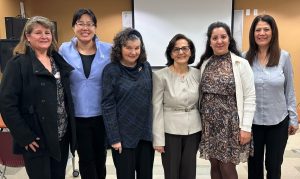 Acceptance of ESL writers is not an issue for the Literacy Council. After the completion of each edition of Reflections: Voices of English Learners, adult learners, their families, event sponsors, volunteer tutors, staff, and members of the Board of Directors come together to celebrate and recognize the students during the annual Book Launch event. “The Book Launch is a huge experience for students where they can share their stories and celebrate their achievements,” Catherine notes. Students proudly read their stories aloud to the audience and then get a chance to congratulate and catch up with their fellow authors.
Acceptance of ESL writers is not an issue for the Literacy Council. After the completion of each edition of Reflections: Voices of English Learners, adult learners, their families, event sponsors, volunteer tutors, staff, and members of the Board of Directors come together to celebrate and recognize the students during the annual Book Launch event. “The Book Launch is a huge experience for students where they can share their stories and celebrate their achievements,” Catherine notes. Students proudly read their stories aloud to the audience and then get a chance to congratulate and catch up with their fellow authors.
The recent event on Oct. 17 served as a continuation of the earlier Reflections: Voices of English Learners launch in February that celebrated the magazine’s sixth edition. The evening provided student authors who hadn’t read their stories during the earlier gathering the opportunity to do so. Plans are underway to spotlight the launch of the magazine’s seventh edition early next year.
For now, Catherine is happy to keep working on Reflections: Voices of English Learners with the help of a few dedicated Literacy Council volunteers, staff, and the support of area sponsors. Catherine continues to prove what people can do when they find a way to share their voices, written from the heart.
This magazine is made possible through the generous support of donors and sponsors in our community. Your gift, no matter the size, can make a tremendous impact in helping our adult learners’ voices to be heard. If you would like to make a one-time online donation, please use this LINK and note “Reflections: Voices of English Language Learners” in the “Purpose of Donation” field. If you would like to learn more about sponsoring this publication on an on-going basis, please contact Maggie Clingman, Development Coordinator, at mclingman@frederickliteracy.org or via (301) 600-2055.
Note: The first edition of Reflections: Voices of English Learners was in 2018 containing 40 pages and featured 30 stories. The seventh edition, which will be published in early 2025, contains 65 pages, 53 stories, and two poems.


